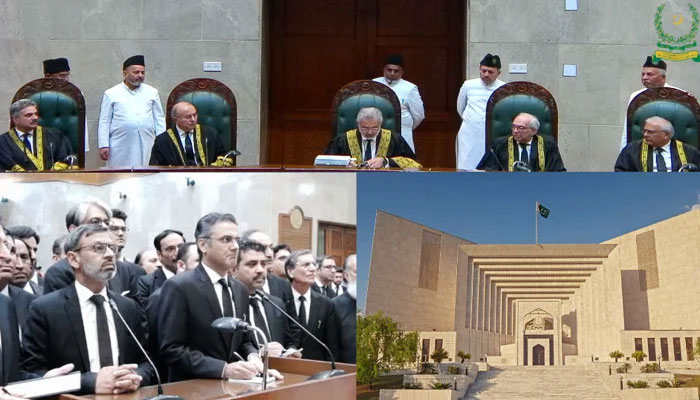PTI’s big win
Supreme Court's 8-5 majority verdict nullifies Peshawar High Court's (PHC) earlier decision
In a monumental legal victory for the Pakistan Tehreek-e-Insaf (PTI), the Supreme Court of Pakistan ruled on Friday that the party is entitled to the allocation of reserved seats in the National Assembly. This decision not only marks a significant triumph for PTI but also reshapes the political landscape, increasing pressure on the coalition alliance and altering the composition of the National Assembly. The Supreme Court's 8-5 majority verdict, delivered by Justice Mansoor Ali Shah, nullifies the Peshawar High Court's (PHC) earlier decision that upheld the Election Commission of Pakistan's (ECP) ruling against PTI's reserved seats. This pivotal judgment reinstates the PTI's eligibility and mandates that the ECP apply all statutory provisions fairly, ensuring the party's rightful participation in the parliamentary process. In its decision, the Supreme Court declared that the lack or denial of an election symbol does not in any manner affect the constitutional or legal rights of a political party to participate in an election, whether general or by-polls, and to field candidates and that the ECP is under a constitutional duty to apply all statutory provisions accordingly. The roots of this legal battle trace back to the February 8 elections, where over 80 PTI-backed independent candidates emerged victorious. These candidates, subsequently joining the Sunni Ittehad Council (SIC), sought reserved seats for minorities and women. However, the ECP's December 2023 ruling denied these seats, citing procedural lapses and the party's failure to submit a mandatory list of candidates. The implications of this ruling are profound.
The PTI has obviously hailed this as a victory. On the other hand, federal government ministers are saying that the top court has rewritten the constitution as this verdict is against the plain reading of the constitution. For legal experts, this decision gives hope that the judiciary is not going to bow down to any pressure. The decision is also clear in reaffirming the PTI's status as a political party with the right to reserved seats, and rectifying the misinterpretation of the Supreme Court's earlier rulings and ensuring that the ECP's decisions align with constitutional mandates. The PTI's return to parliament disrupts the coalition's two-thirds majority, which was crucial for constitutional amendments. The coalition, comprising the PML-N and the PPP and others, now faces a more formidable opposition, potentially altering legislative dynamics.
The verdict is not without its naysayers though, especially with regard to what critics say is confusion inherent in the verdict. The ruling has said that the PTI should present a list of eligible candidates for the reserved seats to the electoral body within 15 days after the verdict when PTI was not a petitioner. Experts have said that the court’s ruling that the 39 candidates whose affiliation was with the PTI will remain the successful candidates of the PTI while the remaining 41 candidates can also submit their affidavits within 15 days that they were candidates of the same party has led to some confusion. The PTI now potentially emerges as the largest party in the National Assembly; its opposition alliance is set to hold 120 seats. The ruling alliance is obviously still in the majority but the numbers may be worrying for the ruling party (PML-N). Political observers are of the opinion that while this is a big moral victory for the PTI, it does not change things on the ground since Imran Khan continues being incarcerated. They do point out though that the government made a blunder, along with the ECP, by allotting the reserved seats to other parties. As the political landscape adjusts to this current new reality, all stakeholders must prioritize dialogue, cooperation, and respect for legal processes.
-
 Noel Gallagher Gives Shut-up Call To Critics After Receiving BRIT Award
Noel Gallagher Gives Shut-up Call To Critics After Receiving BRIT Award -
 Pentagon Used Anthropic’s Claude AI In Iran Attack Despite Ban: Report
Pentagon Used Anthropic’s Claude AI In Iran Attack Despite Ban: Report -
 Nvidia Teams Up With Telecom Firms For AI Driven 6G
Nvidia Teams Up With Telecom Firms For AI Driven 6G -
 SpaceX Launches 25 Starlink Satellites On Its Falcon 9 Booster From The West Coast
SpaceX Launches 25 Starlink Satellites On Its Falcon 9 Booster From The West Coast -
 Expert Reveals What Makes Investigations Hard In Search Of Savannah Guthrie Mother Nancy: 'Silent Witness'
Expert Reveals What Makes Investigations Hard In Search Of Savannah Guthrie Mother Nancy: 'Silent Witness' -
 'SNL's Strongly Reacts To BAFTA's Racial Slur With Tourette’s Sketch
'SNL's Strongly Reacts To BAFTA's Racial Slur With Tourette’s Sketch -
 Austin Shooting Leaves Multiple Dead, Dozens Injured
Austin Shooting Leaves Multiple Dead, Dozens Injured -
 Meghan Markle Friends Break Silence As Duchess Plan To Return To UK
Meghan Markle Friends Break Silence As Duchess Plan To Return To UK -
 Dua Lipa Stuns Everyone On And Off Stage At 2026 BRIT Awards
Dua Lipa Stuns Everyone On And Off Stage At 2026 BRIT Awards -
 2026’s Most Visited Websites Revealed: ChatGPT Overtakes Major Platforms
2026’s Most Visited Websites Revealed: ChatGPT Overtakes Major Platforms -
 Worst Cricket Moments That Shocked The Game
Worst Cricket Moments That Shocked The Game -
 Prince Harry, Meghan Markle Reach A Crossroads: ‘You Could Lose Everything’
Prince Harry, Meghan Markle Reach A Crossroads: ‘You Could Lose Everything’ -
 F1 Title Race: Who Will Win 2026 Drivers’ And Constructors’ Championships?
F1 Title Race: Who Will Win 2026 Drivers’ And Constructors’ Championships? -
 New Observatory Sends 800,000 Asteroid Alerts In One Night
New Observatory Sends 800,000 Asteroid Alerts In One Night -
 Cher’s Son Elijah Blue Allman Apprehended On Two Counts Of Assault At Elite Prep School
Cher’s Son Elijah Blue Allman Apprehended On Two Counts Of Assault At Elite Prep School -
 Beatrice, Eugenie Now Face Andrew, Sarah's ‘nightmares’: 'They're Hugely Conflicted'
Beatrice, Eugenie Now Face Andrew, Sarah's ‘nightmares’: 'They're Hugely Conflicted'




